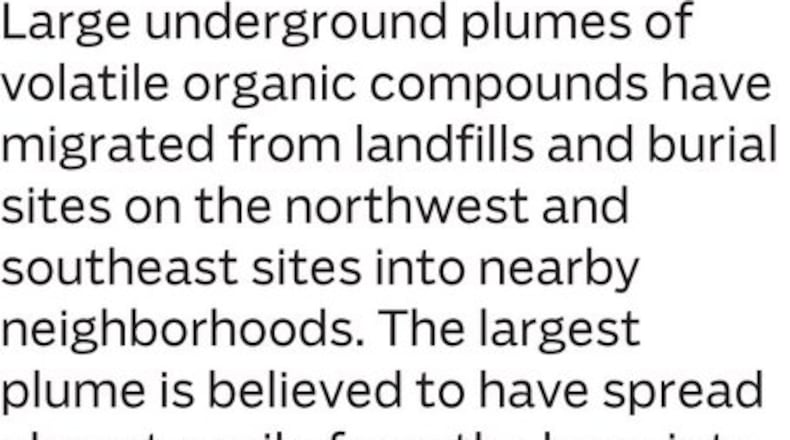How We Got The Story
The AJC began investigating contamination at Fort Gillem in early 2013 after learning that the state was talking to federal officials about listing the former base as a Superfund site. Using documents obtained through state open records and federal Freedom of Information requests, the paper learned that the state and the U.S. Army were clashing over the pace of the cleanup and that the contamination was continuing to seep into a the groundwater of a nearby residential community. The documents mentioned that officials were launching a vapor intrusion study, which would examine whether chemicals were moving into the air of home near the site. This story follows up on those tests.
Toxic vapor is accumulating in some homes near Fort Gillem, suggesting carcinogens dumped at the U.S. Army base decades ago may have migrated from the groundwater into the air residents breathe, The Atlanta Journal-Constitution has learned.
Tests conducted this summer found hazardous chemicals in levels high enough to pose a danger to human health in the air of 26 of 29 homes sampled. More than 200 buildings are still to be tested, including a day care center close to the former military depot, just south of Atlanta.
Army officials will begin informing residents of the results in the coming days and offering to install ventilation systems for affected homeowners.
Less clear is what additional steps military brass will take to stem the flow of chemicals at their source: burial sites on the base where engine oil and other toxic industrial solvents were dumped for years before the practice was outlawed. Those contaminants have found their way into groundwater that has seeped off the base in a plume that stretches for nearly one mile into a residential community.
Residents near the base have for years been warned not to drink water from wells in the area. But the revelation that chemicals have moved into the air creates a disturbing new twist.
Gov. Nathan Deal weighed in on Thursday calling the level of contamination “significantly greater than originally anticipated.”
“I am concerned that many more of the remaining homes are contaminated at levels dangerous to human health,” Deal wrote in a letter to the Army’s top environmental official. The Republican governor urged the military to move rapidly to test the additional homes and install mitigation measures to those homes already affected.
An Army timetable would not have the project completed until November 2015.
Deal said such a delay “poses an unacceptable risk to the health of Georgia citizens.”
State environmental officials had long been pushing for the air study. But documents reviewed by the AJC show the Army — which is in charge of the cleanup at their former installation — questioned the need for one.
“The Army didn’t expect to find this,” state Environmental Protection Division Compliance Chief Bert Langley said in an interview with the AJC.
U.S. Army officials had no immediate comment.
The contamination levels detected in the 38 home air tests conducted this summer did not reach the most serious environmental benchmark, which would have triggered an evacuation of residents. But 26 of the homes recorded levels high enough to require the Army to take corrective action. Three homes showed no vapor contamination problems. Results were not back yet for the remaining homes, officials said.
Experts say that in addition to creating health risks for residents breathing the air, volatile organic compounds can also become flammable at high levels.
MaKara Rumley, an attorney with environmental law group Greenlaw has been working on the Gillem issue trying to raise awareness among residents in the affected neighborhoods. She called the early results troubling.
“What gives me greatest concern is that the community is made aware of the results right away and that the any mitigation move forward quickly and aggressively,” Rumley said.
Fort Gillem officially closed in September 2011 as part of an overall military restructuring. It had spent most of its active life as a depot, a hub for the repair and storage of vehicles. Somewhere on the base a mustard bomb is buried, although military officials maintain it has been decontaminated.
Cleanup at the World War II-era base has been sluggish as state officials have clashed repeatedly with the Army over the way forward. Last year, state officials grew so frustrated with the Army's slow pace that they asked the U.S. Environmental Protection Agency to consider making the abandoned post a Superfund site. Such a move would have almost certainly halted plans to transform Gillem into an industrial hub, designed to deliver badly-needed jobs to Clayton County. The first step in that makeover occurred last month when grocery giant Kroger broke ground for a new distribution center expected to eventually create 1,500 new jobs.
Among the chemicals detected in the air study are benzene and trichloroethylene (TCE), both listed as known carcinogens by the U.S. Department of Health and Human Services.
Linda Seagroves said she isn’t surprised by news that the chemicals may have spread. Seagroves lived near Fort Gillem for close to 15 years but recently moved to Colorado, in part because the environmental risks made her uneasy.
“I couldn’t handle it anymore,” Seagroves said. “I was scared to live there.”
But Eloise Belle Isle said she has lived in the community since 1951 and has no concerns. The 92-year-old has had her home tested and hasn’t heard the results but expects them to come back clean.
“They checked me out. Why not?” the 92-year-old asked. “But I’ve never had any bad illnesses to speak of. I’m not worried.”
About the Author




